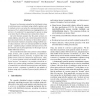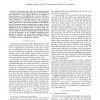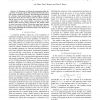PDCAT
2005
Springer
13 years 10 months ago
2005
Springer
Fault tolerant algorithms are often designed under the t-out-of-n assumption, which is based on the assumption that all processes or components fail independently with equal proba...
ICDCS
2005
IEEE
13 years 10 months ago
2005
IEEE
We prove two theorems saying that no distributed system in which processes coordinate using reliable registers and -resilient services can solve the consensus problem in the prese...
SAC
2006
ACM
13 years 10 months ago
2006
ACM
We solve the consensus problem using a new class of broadcasts that are very appropriate to ad-hoc networking: every broadcast message is eventually ensured to be garbagecollected...
CDC
2008
IEEE
13 years 11 months ago
2008
IEEE
— This paper deals with the consensus problem under communication network inducing delays. It is well-known that introducing a delay leads in general to a reduction of the perfor...
CDC
2008
IEEE
13 years 11 months ago
2008
IEEE
— This paper analyzes two classes of consensus algorithms in presence of bounded measurement errors. The protocols taken into account adopt an updating rule based either on const...
CDC
2008
IEEE
13 years 11 months ago
2008
IEEE
— In this paper we discuss the consensus problem for a network of dynamic agents with undirected information flow and random switching topologies. The switching is determined by...



